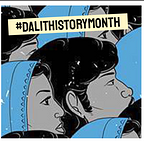Fatima Sheikh and her invaluable contribution to education
Today in #DalitHistory, we honour the contribution of Fatima Sheikh, a Muslim woman who stood steadfast in solidarity with the cause of educating Dalits, Adivasis, Bahujans, and women. It is important to note that this was at a time when many upper-Caste Hindus remained wary. Fatima Sheikh is now widely regarded as the first Muslim woman teacher of the 19th century.
On seeing Jyotirao and Savitribai Phule’s efforts to teach women and individuals from oppressed Castes, the locals actively threatened their families who, fearing violent retaliation, asked them to either stop their activities or leave home.
Even when their family members, Caste brethren, and their larger community didn’t stand up for their beliefs, it was Fatima Sheikh who offered them her home. As a Muslim woman, especially one going against Brahminical norms, the risk she undertook on herself, and her family, cannot be understated. Fatima not only sheltered the Phules’ from dominant Caste abuse but also helped them set up the first girls’ school in her house, calling it “Indigenous Library”.
Soon after, Fatima and Savitribai enrolled in the same teacher training institute to be trained as professional teachers. Their friendship was one of respect, compassion and synergy. Throughout their time together, Savitri would often mention her, with affection and concern, in her letters to Jyotirao. Today, their friendship lives in the form of the work they have done in creating both foundational will and actual structures towards the upliftment of the marginalized. Fatima continued to teach and work alongside Savitribai in their school until 1856.
Relationships between Muslims, Dalits, Adivasis and Bahujans carry a long history of struggle against Brahminical oppression that is often erased or misrepresented by today’s upper class Savarna-dominated political agendas. It remains undeniable that the association of Savitribai, Jyotirao, Fatima and the Dalit, Adivasi and Bahujan communities they worked with, represents a line of solidarity continuing into the contemporary call for Unity of The Oppressed; a call that seeks to merge the struggles of SC/ST/OBC and Religious Minorities.
